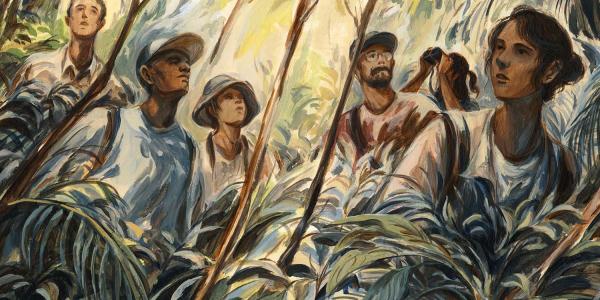 When Anna Iwanciw (IntlAf’22) was in high school, her class watched the documentary Cowspiracy: The Sustainability Secret, prompting her to become a vegetarian and reduce her personal carbon footprint.
When Anna Iwanciw (IntlAf’22) was in high school, her class watched the documentary Cowspiracy: The Sustainability Secret, prompting her to become a vegetarian and reduce her personal carbon footprint.
Iwanciw feels her education directly impacted her views on climate change. And now she wants all women to have access to the same things she’s learned.
“I’m a firm believer that everything is interconnected,” Iwanciw said.
She points to a 2021 report by the Malala Fund, a nonprofit that advocates for girls’ education, which points out the double-edged sword of gender inequity in education. By 2025, climate change is on track to be a contributing factor in preventing some 12.5 million girls yearly from completing their education, according to the report.
“Whether it’s flooding or escaping wildfires, these girls suddenly become refugees of the climate crisis,” Iwanciw said.
On the flip side, education has the potential to mitigate the climate crisis by giving young people the tools to challenge its root causes, the resilience to handle disasters and the knowledge to find solutions.
“There’s a stigma in some countries that women shouldn’t be educated,” said Iwanciw. “And that’s really to the detriment of our society.”
While at CU, Iwanciw has become an ardent advocate for girls’ education through a social media internship and volunteer work with Girls Education International, a nonprofit dedicated to providing girls in remote locations with education. She also produces Girls Ed podcasts, interviewing people like women’s rights activist Anbreen Ajaib, executive director of Project Bedari, a Girls Ed partner in Pakistan. The agency also works with Project Wezesha in Tanzania, which focuses on issues like providing safe transportation to school.
Iwanciw has already seen the impact of the nonprofit’s work — and the overlap between education and climate change. Saraphina Matombi Matias, a student from Kagongo, Tanzania, who was supported by Girls Ed and Project Wezesha, is now teaching people in her village about the environment and encouraging them to plant trees and manage waste properly — all while working toward a bachelor’s degree in education at the University of Dodoma.
“Basically, if we educate women, we could potentially save the world,” Iwanciw said.





